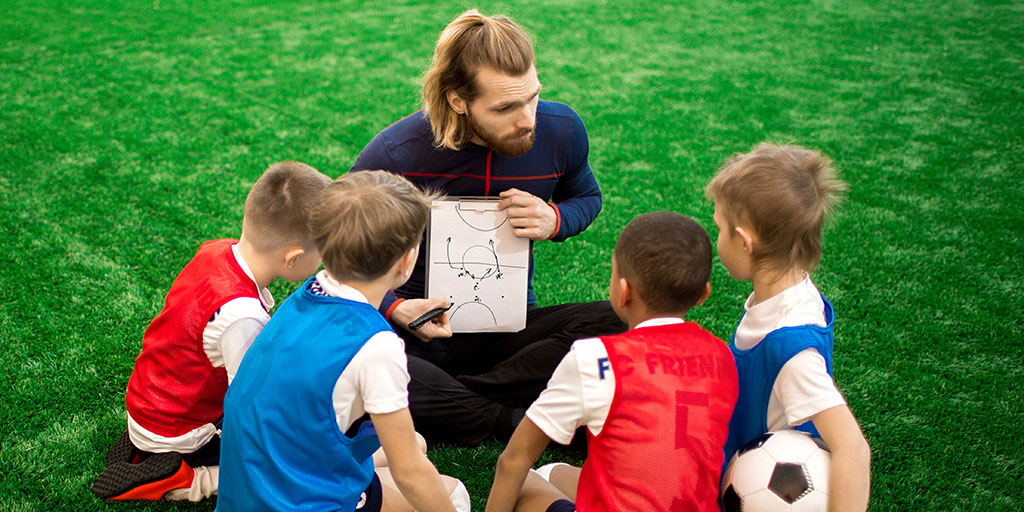Good news! You’ve got them on the field but how do you make sure they’re learning the right lessons to keep them in good stead for life?
Well, they need to see competition as something more than just winning and losing. There goes that old saying about, ‘It’s about the taking part…’, but the reason it’s so well-known is that it’s so…true.
Nobody wins all the time and often when a loss occurs in any situation, it can be a serious de-motivator. We, therefore, need to manage competitions in a healthy way that caters to a variety of abilities and builds solid skills and values. Whether they dream of starting for Man United or donning a uniform to save kittens trapped in trees, healthy values like sportsmanship in competition have no end of benefits in later life.
Set a good example
Kids are like sponges. What you put out there they will absorb and being kids, they are much more likely to absorb the negative as opposed to the positive. Avoid after the watershed language and keep your criticism constructive. If they are to learn to be leaders who can rally a team, they need to learn that the advice they receive and give out, must offer their teammates something to work towards.
A child may prefer to get involved in the organisational side of the sport, perhaps they play for fun or maybe they want to be a serious competitor. In any case, how you phrase their criticism or how you treat them on the pitch, will affect their confidence levels on and off it. It’s not something that just affects group environments, negative criticism can sometimes be reflecting in their behaviour towards themselves. If you can’t learn from your mistakes because you’re too busy dwelling on them, it’ll be pretty hard for them to improve.
Never let your personal frustrations affect how you treat coaches and referees when your children are in earshot. Yes, of course, there are times when you need to speak seriously about your child but don’t stoop to personal attacks on their character. Children need to respect their coaches and referees and follow their instructions. This is crucial to learning any skills, discipline and the basic rules of any game.
All skills are good skills
Learning should never stop at the classroom door. Lifelong learning should be the aim of every experience. When it comes to competition though, you need to keep your focus on the process rather than the outcome.
That means there shouldn’t be a focus on winning and losing but rather respect, enthusiasm, and integrity. In games, for example, changing the scoring rules of school competitions can be a great motivator. For example, an intra-school football tournament can use a scoring system that rewards children for goals on target, sportsmanship or stopping a goal. This way, every team will get points and, there’s more of an incentive to work together and play better.
Rewarding sportsmanship can be as easy as helping a player up when they’ve fallen. Giving attention to these types of behaviours encourages children to keep showing up and builds a consistent level of positivity around this activity. It’s about how children play the game, how they treat their team members and encourage each other. This is especially the case for players that are maybe more driven than others. Teaching them how to encourage others is a great motivator for them and for those that struggle.
School competition means EVERYONE
There’s a tendency amongst kids that they point out the kids that are the best at a sport and have them take the brunt of the work. Sometimes adults get caught up in this too. If everyone is supposed to take part, then you need to set an example by encouraging everyone to get involved.
Take a sports day, for example. There are lots of roles in a sports day that can get children moving. Organisational roles that have some children putting out cones or fetching eggs and spoons. Sports where individuals are playing can also have children as spectators cheering them on. Parents, coaches, volunteers – anybody who is responsible for children taking part, should make sure they do.
When people don’t take part, often there are a myriad of reasons behind it. From physical confidence to disinterest in the sport. Kids that show good values will try and bolster these individuals anyway. For example, cheering them on, offering them advice, helping them up when they fall and even passing the ball to them. Making people feel a part of a team is a great way to encourage productivity in all their future working relationships.
Respecting decisions or outcomes with grace
Teach children to take ownership with organisational roles such as refereeing or just generally encouraging all students to be active on the sidelines. As referees or organisers, they are part of building an experience for their peers. It helps them learn problem-solving and conflict resolution in an environment where adults can be final arbiters on effective behaviour.
Part of these types of roles is respecting calls and the outcome of a game. Emphasise the importance of listening to these outcomes and then moving on. Nobody likes a sore loser, and we especially don’t like boastful winners. Accepting these types of things with grace carries over into their adult life.
Appreciating the contributions of their peers is the difference needed to ensure everyone works as a team to get work done and not in a way that can drive a serious wedge of frustration. They need to be team players on and off the pitch, especially in situations that are difficult.



